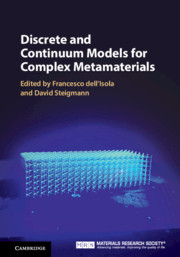Book contents
- Frontmatter
- Contents
- List of Contributors
- Part I Designing Complex (Meta)Materials: Results and Perspectives
- Part II Mathematical and Numerical Methods
- 4 Naive Model Theory: Its Applications to the Theory of Metamaterials Design
- 5 Lagrangian Discrete Models: Applications to Metamaterials
- 6 Experimental Methods in Pantographic Structures
- 7 Variational Methods as Versatile Tools in Multidisciplinary Modeling and Computation
- 8 Least Action and Virtual Work Principles for the Formulation of Generalized Continuum Models
- Index
4 - Naive Model Theory: Its Applications to the Theory of Metamaterials Design
from Part II - Mathematical and Numerical Methods
Published online by Cambridge University Press: 20 February 2020
- Frontmatter
- Contents
- List of Contributors
- Part I Designing Complex (Meta)Materials: Results and Perspectives
- Part II Mathematical and Numerical Methods
- 4 Naive Model Theory: Its Applications to the Theory of Metamaterials Design
- 5 Lagrangian Discrete Models: Applications to Metamaterials
- 6 Experimental Methods in Pantographic Structures
- 7 Variational Methods as Versatile Tools in Multidisciplinary Modeling and Computation
- 8 Least Action and Virtual Work Principles for the Formulation of Generalized Continuum Models
- Index
Summary
A most crucial aspect of the intellectual activity needed to comprehend the theory of metamaterials consists in the capacity to distinguish between the physical object which is studied and the possibly different models used to describe it, in different situations. A metamaterial is a material whose behavior is chosen "a priori" by fixing the mathematical model to be used to describe it, in a specific set of conditions. In a sense, ontologically, in the theory of metamaterials the models are used to define "a posteriori" some physical objects. In this context the "feasibility" or "possibility of existence" of a certain material represents a major conceptual problem. For these reasons a scientist working in this field must be aware of some basic concepts of Model Theory.
Information
- Type
- Chapter
- Information
- Discrete and Continuum Models for Complex Metamaterials , pp. 141 - 196Publisher: Cambridge University PressPrint publication year: 2020
Accessibility standard: Unknown
Why this information is here
This section outlines the accessibility features of this content - including support for screen readers, full keyboard navigation and high-contrast display options. This may not be relevant for you.Accessibility Information
- 6
- Cited by
